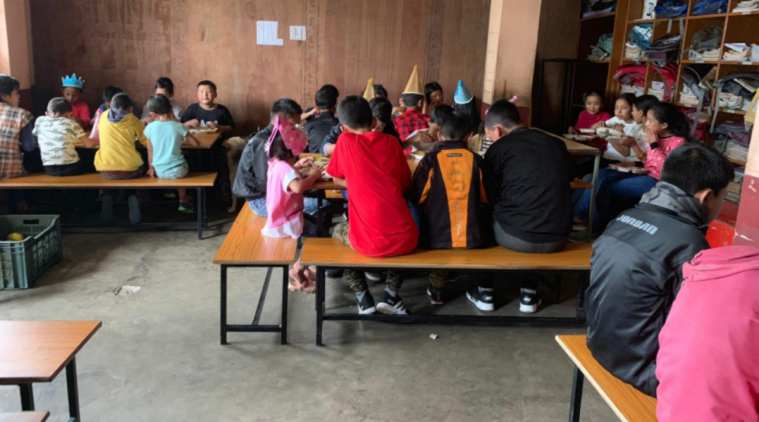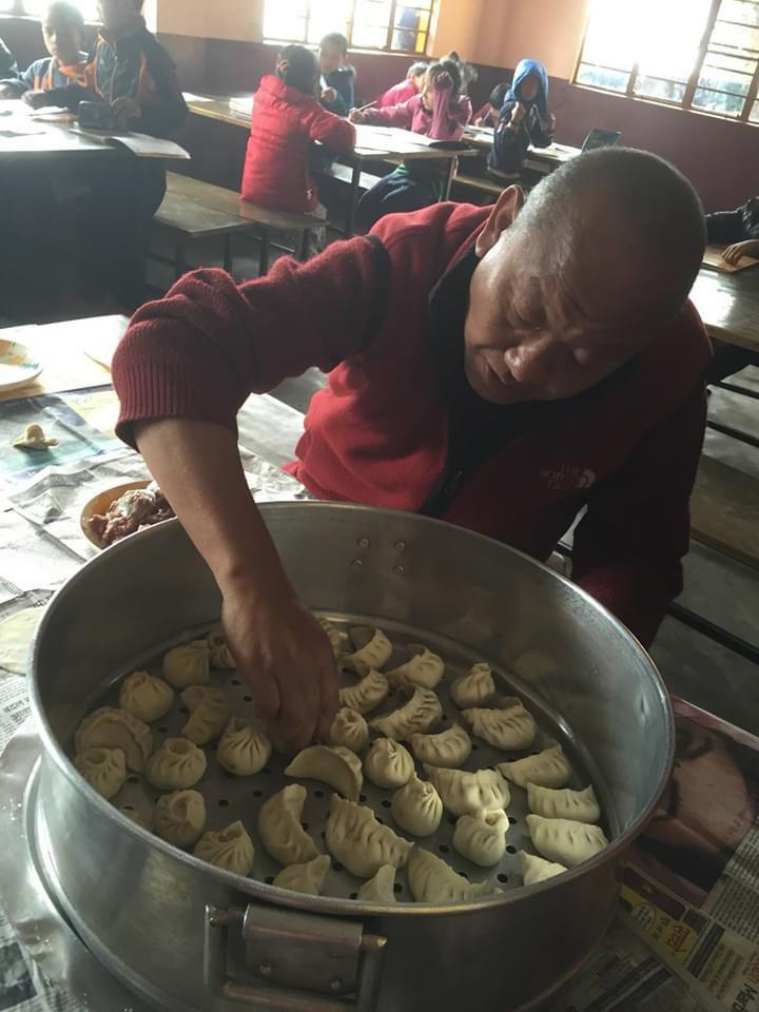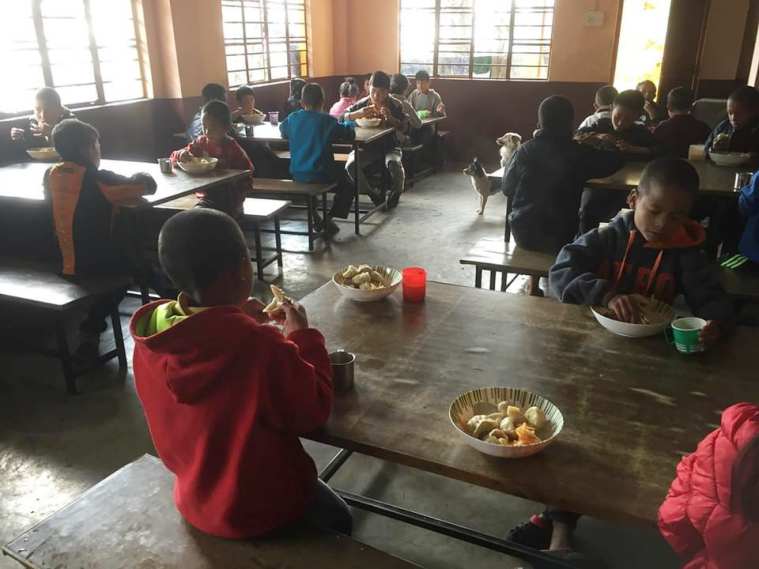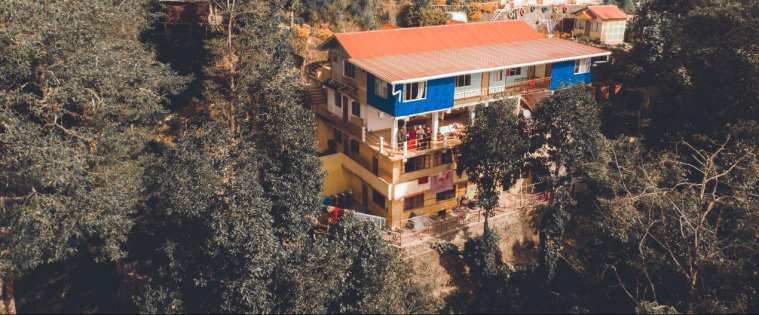 The children at Pema-Tsel, which means ‘the lotus garden’, come from the remotest corners of east Sikkim, Kalimpong and other parts of West Bengal. (Source: Penjo Bhutia)
The children at Pema-Tsel, which means ‘the lotus garden’, come from the remotest corners of east Sikkim, Kalimpong and other parts of West Bengal. (Source: Penjo Bhutia)
“Bachche itna halla karte hain ki phone pe kuchh nahin sunayi deta (the children are shouting so much that I can’t hear a thing on the phone),” says Penjo Bhutia. A few moments later, presumably from another room, he adds, “It is a big problem that the schools are closed. The children don’t go anywhere because of the lockdown. Teachers used to look after them for a few hours of the day, but now the children are running around the house 24×7. From morning to night, we are on our feet making sure they don’t fall or hurt themselves.”
Does the sentiment sound familiar after two months of lockdown? Unlike most parents, Bhutia is a Tibetan Buddhist monk, who is looking after 14 underprivileged children in an orphanage-cum-hostel, Pema-Tsel Academy, which he runs in a small village of east Sikkim, Phadamchen.
The children at Pema-Tsel, which means ‘the lotus garden’, come from the remotest corners of east Sikkim, Kalimpong and other parts of West Bengal. “Some of them have one parent or no parent. They belong to extremely poor families, where survival is the only necessity, and going to school is a luxury,” adds Bhutia or Lamaji.
 The children at Pema-Tsel, which means ‘the lotus garden’, come from the remotest corners of east Sikkim, Kalimpong and other parts of West Bengal. (Source: Penjo Bhutia)
The children at Pema-Tsel, which means ‘the lotus garden’, come from the remotest corners of east Sikkim, Kalimpong and other parts of West Bengal. (Source: Penjo Bhutia)
While parents, worldwide, wonder if they are doing a good job in a world reshaped by the coronavirus, Bhutia has whittled child-raising to one word — happiness. At the end of the pandemic, this Covid warrior wants to say, “Bachche khush hain (the children are happy)”. Last week, the entire household sat together in the kitchen to make Thentuk, a traditional Tibetan soup from vegetable, meat and wheat flour. “The kneaded lump of wheat flour has to be pulled by hand, like a chewing gum, and then chopped into little pieces before boiling in the soup. We had fun doing that,” he says.
With children, it is important to feed the body and free the mind. So, the seven-year-old crashing his helicopter into an older group’s Ludo game does not know that the Lama is worried about money. The adolescents, who take multiple servings of rice, dal and vegetable at every meal, are unaware that a part of the food has been provided by the Sikkim government. Fighting over the TV remote or glued to cartoons, the group, between seven and 16, have no inkling that a virus without a vaccine has cut off the Lama’s only regular source of income.
“We run a homestay called Mandala. The scenic beauty in these parts is famous among nature lovers. Tourists come from far for birdwatching, to see the sunrise or soak in the view of the hills and valleys. The Pangolakha Wildlife Sanctuary is a huge attraction for people, especially from Bengal, so we used to earn well. Our peak season is from April to June but tourism has totally shut down during to the pandemic and we have no financial cover,” says Bhutia. He is depending on local donations and well-wishers to see them through.
 With children, it is important to feed the body and free the mind. So, the seven-year-old crashing his helicopter into an older group’s Ludo game does not know that the Lama is worried about money. (Source: Penjo Bhutia)
With children, it is important to feed the body and free the mind. So, the seven-year-old crashing his helicopter into an older group’s Ludo game does not know that the Lama is worried about money. (Source: Penjo Bhutia)
“Even when I was myself a child, I used to think, ‘I will do something for impoverished children’. High above Phadamchen, there is a village called Dzuluk, which was very backward. Even locals of Sikkim had not heard of it. I was born in that village. My mother and father settled here after they came from Sikkim in 1959. My father used to work as a labourer. I was sent to a monastery in Kalimpong, to live and become a monk,” he says.
The Pema-Tsel Academy comprises the orphanage- hostel, started in 2002, and a primary school he started in 2014. The school, which has been closed due to the pandemic, has 10 teachers for Hindi, English, Nepali, Social Sciences, Science and Art, among others. Bhutia’s children attend the school before graduating to a government high school next door. There are 110 pupils, which includes children from neighbouring villages. “The orphanage-hostel has around 40 people, including the staff. We thought the lockdown would be for a few days or, maximum, one month. So, some children went back to their villages if they had a mother or a father or any relative living. Those little ones, who have no homes to go to, are here with me,” says the monk.
 The younger ones use the time to play or sleep. Running down the hillside or entering the jungle is forbidden — which means everybody attempts it. (Source: Sushil Chikane)
The younger ones use the time to play or sleep. Running down the hillside or entering the jungle is forbidden — which means everybody attempts it. (Source: Sushil Chikane)
As in crime fiction, the naughtiest child in the orphanage-hostel is the smallest. A seven-year-old, who has no family, has kept the Lama and his staff busy through the lockdown. He doesn’t stay still for stories either, unless it is on TV. “As for the rest, we keep them busy,” says the Lama. The orphanage-hostel wakes up at 5.30 am. Study time begins at 6 am, 7.30 am is breakfast and 8 am to 10 am is classes in the hostel. After 10 am, the older children help out with peeling potatoes or chopping vegetable in the kitchen. The younger ones use the time to play or sleep. Running down the hillside or entering the jungle is forbidden — which means everybody attempts it. “After lunch, between 12 and 1 pm, the children are free. Some will watch TV while others will sleep. At 3 pm, there is evening tea with biscuit or jhalmuri, and classes again from 3 pm to 5 pm. After dinner, at 8 pm, the children watch TV for an hour before sleeping,” he says. “That is how we pass the time. That is how we try to stay happy.”